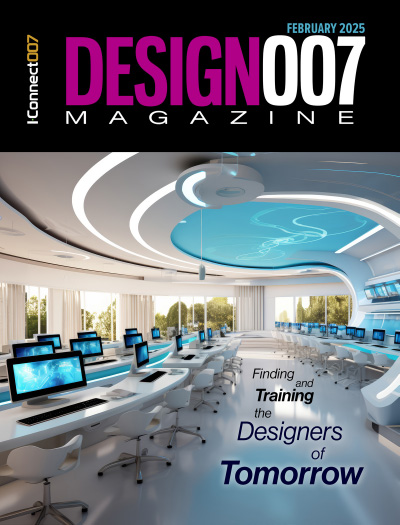-

- News
- Books
Featured Books
- design007 Magazine
Latest Issues
Current Issue
Learning to Speak ‘Fab’
Our expert contributors clear up many of the miscommunication problems between PCB designers and their fab and assembly stakeholders. As you will see, a little extra planning early in the design cycle can go a long way toward maintaining open lines of communication with the fab and assembly folks.

Training New Designers
Where will we find the next generation of PCB designers and design engineers? Once we locate them, how will we train and educate them? What will PCB designers of the future need to master to deal with tomorrow’s technology?

The Designer of the Future
Our expert contributors peer into their crystal balls and offer their thoughts on the designers and design engineers of tomorrow, and what their jobs will look like.
- Articles
- Columns
Search Console
- Links
- Media kit
||| MENU - design007 Magazine
DARPA-Funded Research Leads to Quantum Computing Breakthrough
December 8, 2023 | DARPAEstimated reading time: 4 minutes
A team of researchers working on DARPA’s Optimization with Noisy Intermediate-Scale Quantum devices (ONISQ) program has created the first-ever quantum circuit with logical quantum bits (qubits), a key discovery that could accelerate fault-tolerant quantum computing and revolutionize concepts for designing quantum computer processors.
The ONISQ program began in 2020 seeking to demonstrate a quantitative advantage of quantum information processing by leapfrogging the performance of classical-only supercomputers to solve a particularly challenging class of problem known as combinatorial optimization. The program pursued a hybrid concept to combine intermediate-sized “noisy”— or error-prone — quantum processors with classical systems focused specifically on solving optimization problems of interest to defense and commercial industry. Teams were selected to explore various types of physical, non-logical qubits including superconducting qubits, ion qubits, and Rydberg atomic qubits.
The Harvard research team, supported by MIT, QuEra Computing, Caltech, and Princeton, focused on exploring the potential of Rydberg qubits, and in the course of their research made a major breakthrough: The team developed techniques to create error-correcting logical qubits using arrays of “noisy” physical Rydberg qubits. Logical qubits are a critical missing piece in the puzzle to realize fault-tolerant quantum computing. In contrast to error-prone physical qubits, logical qubits are error-corrected to maintain their quantum state, making them useful for solving a diverse set of complex problems.
Harvard has built quantum circuits with around 48 Rydberg logical qubits to date in their laboratory, the largest number of logical qubits in existence. Rapidly scaling the number of logical qubits is anticipated to be relatively straight forward thanks to the nature of Rydberg qubits and how they can be manipulated.
“Rydberg qubits have the beneficial characteristic of being homogenous in their properties – meaning each qubit is indistinguishable from the next in how they behave,” said Dr. Mukund Vengalattore, ONISQ program manager in DARPA’s Defense Sciences Office. “That’s not the case for other platforms such as superconducting qubits where each qubit is unique and therefore not interchangeable. The homogeneity of Rydberg qubits allows them to scale rapidly and also allows them to be manipulated and moved around easily using lasers on a quantum circuit. This overcomes the current error-prone methods of performing qubit operations by having to connect them sequentially, which propagates errors throughout the chip. It’s now possible to imagine dynamic reconfiguration of qubits on a quantum chip, where you’re no longer limited to a sequential process of running quantum circuits. Now, you can bring entire collections of qubits, all of them, from one place in the circuit to another place on the circuit using laser tweezers, run an operation, and then put them back where they were originally. Dynamically reconfigurable and transportable Rydberg logical qubits open up completely new concepts and paradigms for designing and building scalable quantum computing processors.”
“If anyone had predicted three years ago when the ONISQ program began that Rydberg neutral atoms could function as logical qubits, no one would have believed it,” said Dr. Guido Zuccarello, a DARPA technical adviser who has supported the ONISQ program since its start in 2020. “It’s the DARPA way to bet on the potential of these less-studied qubits along with the more well-studied ions and superconducting circuits. As an exploratory program, ONISQ gave researchers the leeway to explore unique and new applications beyond just the optimization focus. As a result, the Harvard-led team was able to leverage much more of the potential of these Rydberg qubits and turn them into logical qubits, which is a very significant discovery.”
While it’s anticipated that at least an order of magnitude greater than 48 logical qubits will be needed to solve any big problems envisioned for quantum computers, the Rydberg logical qubit breakthrough casts new light on the traditional view that millions of physical qubits are needed before a fault-tolerant quantum computer can be developed. Given the prospect of dynamically reconfigurable quantum circuits, it’s too early to say how many logical qubits are needed to solve a particular problem; but it potentially could be far fewer than originally thought.
A focus of DARPA’s various quantum programs dating back to the early 2000s has been to build bridges between the quantum sensing and quantum information science research communities, which traditionally have been siloed. DARPA has helped bring these communities together to advance understanding of how to control and manipulate quantum states at extremely high levels of precision.
“ONISQ research teams could build upon a rich toolbox of quantum knowledge developed across multiple DARPA quantum sensing and quantum information science programs over the past several years,” Vengalattore said. “This toolbox included deep fundamental and technical insights from many DARPA programs, including OLE [Optical Lattice Emulator], QuASAR [Quantum-Assisted Sensing and Readout], ATN [All Together Now], and DRINQS [Driven and Nonequilibrium Quantum Systems].”
Vengalattore emphasized that bringing together the quantum sensing and quantum information science communities under ONISQ allowed for the application of Rydberg quantum sensing knowledge to a quantum computing challenge at a pace that few could have anticipated even a few years ago.
“This merging of research fields building on results from a series of preceding DARPA-led quantum efforts helped facilitate the discovery that Rydberg atoms can be used to create error-corrected, logical qubits,” Vengalattore said. “As exciting and transformative as these results are, we see this as a stepping stone towards a longer-term vision of actualizing disruptive pathways to error-corrected quantum computing and other areas of quantum technology.”
Suggested Items
Nokia, Honeywell Aerospace Technologies Partner with Numana to Advance Quantum-safe Networks
04/01/2025 | HoneywellNokia and Honeywell Aerospace Technologies announced a strategic partnership with Numana to advance Quantum-Safe Networks (QSN) in Montreal, Canada, and worldwide.
New Cryostatic Systems Elevate Current Research on Qubits
03/31/2025 | Fraunhofer IAFThe Center Nanoelectronic Technologies (CNT) at Fraunhofer IPMS has recently acquired new cryostats for the research on qubits and the qualification of superconducting systems.
Xanadu, Corning Sign Collaboration Agreement to Advance Fibre Interconnects for Photonic Quantum Computing
03/26/2025 | PRNewswireXanadu, a leading photonic quantum computing company, and Corning Incorporated, the global leader in fibre, cable and connectivity, will collaborate to develop customized fibre and fibre-array solutions to enable low-loss networking of photonic quantum computing chips.
ULVAC Developing Next-Generation Dilution Refrigerator for Quantum Computing by 2026
03/24/2025 | ACN NewswireULVAC, Inc. and ULVAC CRYOGENICS INC. announced that they are developing a next-generation dilution refrigerator for quantum computers with imput from IBM.
VTT, IQM Launch First 50-qubit Quantum Computer Developed in Europe
03/04/2025 | VTT Technical Research Centre of FinlandVTT Technical Research Centre of Finland and IQM Quantum Computers, one of the global leaders in superconducting quantum computers, have completed and launched Europe’s first 50-qubit superconducting quantum computer, now open to researchers and companies through the VTT QX quantum computing service.


